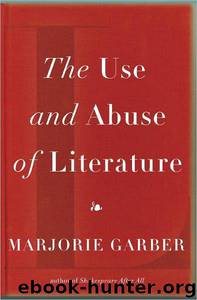The Use and Abuse of Literature by Marjorie Garber

Author:Marjorie Garber
Language: eng
Format: mobi, epub
Tags: Non-fiction, Writing
ISBN: 9780375424342
Publisher: PANTHEON
Published: 2011-03-01T00:00:00+00:00
The reading tactic deployed here is, as I’ve noted, what has been variously called close reading or slow reading or reading in slow motion. The latter phrase is that of Reuben Brower, a professor of English at Harvard in the fifties and sixties and, before that, professor of Greek and English at Amherst College.19 Brower was the legendary teacher of an equally legendary Harvard course, Humanities 6, almost always referred to as Hum 6.
Perhaps the clearest and most eloquent demonstration of how close reading works was offered by one of Brower’s former assistants in the course, Paul de Man, who would become one of the most admired literary exponents of deconstruction, and whose own pedagogy produced a roster of critics as accomplished as Brower’s. Here is de Man’s account, from an essay first published in The Times Literary Supplement in 1982. In its clarity and descriptive analysis, it is well worth quoting at length.
My own awareness of the critical, even subversive, power of literary instruction does not stem from philosophical allegiances but from a very specific teaching experience. In the 1950s, [Walter Jackson] Bate’s colleague at Harvard, Reuben Brower, taught an undergraduate course in General Education entitled “The Interpretation of Literature” (better known on the Harvard campus and in the profession at large as HUM 6) in which many graduate students in English and Comparative Literature served as teaching assistants. No one could be more remote from high-powered French theory than Reuben Brower. He wrote books on Shakespeare and on Pope that are models of sensitive scholarship but not exactly manifestos for critical terrorism. He was much more interested in Greek and Latin literature than in literary theory. The critics he felt closest to, besides Eliot, were Richards and Leavis, and in both of them he was in sympathy with their emphasis on ethics.
Brower, however, believed in and effectively conveyed what appears to be an entirely innocuous and pragmatic precept, founded on Richards’s “practical criticism.” Students, as they began to write on the writings of others, were not to say anything that was not derived from the text they were considering. They were not to make any statements that they could not support by a specific use of language that actually occurred in the text. They were asked, in other words, to begin by reading texts closely as texts and not to move at once into the general context of human experience or history. Much more humbly or modestly, they were to start out from the bafflement that such singular turns of tone, phrase, and figure were bound to produce in readers attentive enough to notice them and honest enough not to hide their non-understanding behind the screen of received ideas that often passes, in literary instruction, for humanistic knowledge.
This very simple rule, surprisingly enough, had far-reaching didactic consequences. I have never known a course by which students were so transformed. Some never saw the point of thus restricting their attention to the matter at hand and of concentrating on the way meaning is conveyed rather than on the meaning itself.
Download
The Use and Abuse of Literature by Marjorie Garber.epub
This site does not store any files on its server. We only index and link to content provided by other sites. Please contact the content providers to delete copyright contents if any and email us, we'll remove relevant links or contents immediately.
| Booksellers & Bookselling | General |
| History of Books |
4 3 2 1: A Novel by Paul Auster(12344)
The handmaid's tale by Margaret Atwood(7714)
Giovanni's Room by James Baldwin(7281)
Asking the Right Questions: A Guide to Critical Thinking by M. Neil Browne & Stuart M. Keeley(5724)
Big Magic: Creative Living Beyond Fear by Elizabeth Gilbert(5699)
Ego Is the Enemy by Ryan Holiday(5370)
The Body: A Guide for Occupants by Bill Bryson(5050)
On Writing A Memoir of the Craft by Stephen King(4901)
Ken Follett - World without end by Ken Follett(4695)
Adulting by Kelly Williams Brown(4541)
Bluets by Maggie Nelson(4526)
Eat That Frog! by Brian Tracy(4489)
Guilty Pleasures by Laurell K Hamilton(4405)
The Poetry of Pablo Neruda by Pablo Neruda(4074)
Alive: The Story of the Andes Survivors by Piers Paul Read(4003)
White Noise - A Novel by Don DeLillo(3987)
Fingerprints of the Gods by Graham Hancock(3972)
The Book of Joy by Dalai Lama(3952)
The Bookshop by Penelope Fitzgerald(3818)
